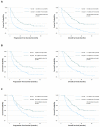Immune-Related Adverse Events, Biomarkers of Systemic Inflammation, and Survival Outcomes in Patients Receiving Pembrolizumab for Non-Small-Cell Lung Cancer
- PMID: 38067207
- PMCID: PMC10705211
- DOI: 10.3390/cancers15235502
Immune-Related Adverse Events, Biomarkers of Systemic Inflammation, and Survival Outcomes in Patients Receiving Pembrolizumab for Non-Small-Cell Lung Cancer
Abstract
Background: Pembrolizumab monotherapy for non-small-cell lung cancer (NSCLC) expressing PD-L1 ≥ 50% doubles five-year survival rates compared to chemotherapy. However, immune-related adverse events (irAEs) can cause severe, long-term toxicity necessitating high-dose steroids and/or treatment cessation. Interestingly, patients experiencing irAEs demonstrate better survival outcomes. Biomarkers of systemic inflammation, including the Scottish Inflammatory Prognostic Score (SIPS), also predict survival in this patient group. This study examines the relationship between inflammatory status, irAEs, and survival outcomes in NSCLC.
Methods: A retrospective analysis was conducted on patients with NSCLC expressing PD-L1 ≥ 50% receiving first-line pembrolizumab monotherapy at a large cancer centre in Scotland. Regression analyses were conducted to examine the relationship between SIPS, irAEs, and survival.
Results: 83/262 eligible patients (32%) experienced an irAE. Dermatological, endocrine, gastrointestinal, and hepatic, but not pulmonary, irAEs were associated with prolonged PFS and OS (p <= 0.011). Mild irAEs were associated with better PFS and OS in all patients, including on time-dependent analyses (HR0.61 [95% CI 0.41-0.90], p = 0.014 and HR0.41 [95% CI 0.26-0.63], p < 0.001, respectively). SIPS predicted PFS (HR 1.60 [95% CI 1.34-1.90], p < 0.001) and OS (HR 1.69 [95% CI 1.41-2.02], p < 0.001). SIPS predicted the occurrence of any irAE in all patients (p = 0.011), but not on 24-week landmark analyses (p = 0.174). The occurrence of irAEs predicted favourable outcomes regardless of the baseline inflammatory status (p = 0.015).
Conclusion: The occurrence of certain irAEs is associated with a survival benefit in patients with NSCLC expressing PD-L1 ≥ 50% receiving pembrolizumab. We find that the association between low levels of systemic inflammation and the risk of irAEs is confounded by their independent prognostic value.
Keywords: Scottish Inflammatory Prognostic Score (SIPS); biomarkers of systemic inflammation; immune-related adverse events; non-small-cell lung cancer; pembrolizumab.
Conflict of interest statement
The authors declare no conflict of interest.
Figures
Similar articles
-
Prognostic value of the Scottish Inflammatory prognostic Score in patients with NSCLC expressing PD-L1 ≥ 50 % progressing on first-line pembrolizumab.Lung Cancer. 2024 Mar;189:107497. doi: 10.1016/j.lungcan.2024.107497. Epub 2024 Jan 29. Lung Cancer. 2024. PMID: 38295631
-
Improved survival and disease control following pembrolizumab-induced immune-related adverse events in high PD-L1 expressing non-small cell lung cancer with brain metastases.J Neurooncol. 2021 Mar;152(1):125-134. doi: 10.1007/s11060-020-03686-3. Epub 2021 Jan 7. J Neurooncol. 2021. PMID: 33415659 Free PMC article.
-
Biomarkers of systemic inflammation predict survival with first-line immune checkpoint inhibitors in non-small-cell lung cancer.ESMO Open. 2022 Apr;7(2):100445. doi: 10.1016/j.esmoop.2022.100445. Epub 2022 Apr 7. ESMO Open. 2022. PMID: 35398717 Free PMC article.
-
Analysis of the association between prospectively collected immune-related adverse events and survival in patients with solid tumor treated with immune-checkpoint blockers, taking into account immortal-time bias.Cancer Treat Rev. 2022 Nov;110:102452. doi: 10.1016/j.ctrv.2022.102452. Epub 2022 Aug 10. Cancer Treat Rev. 2022. PMID: 35998515 Review.
-
Are immune-related adverse events associated with the efficacy of immune checkpoint inhibitors in patients with cancer? A systematic review and meta-analysis.BMC Med. 2020 Apr 20;18(1):87. doi: 10.1186/s12916-020-01549-2. BMC Med. 2020. PMID: 32306958 Free PMC article.
Cited by
-
Prognostic relevance of immune-related adverse events in lung cancer patients undergoing immune checkpoint inhibitor therapy: a systematic review and meta-analysis.Transl Lung Cancer Res. 2024 Jul 30;13(7):1559-1584. doi: 10.21037/tlcr-24-299. Epub 2024 Jul 12. Transl Lung Cancer Res. 2024. PMID: 39118883 Free PMC article.
-
Hepatic immune-related adverse event increased the overall survival of patients with malignancies treated with immune checkpoint inhibitors.Hepatol Int. 2025 Apr 8. doi: 10.1007/s12072-025-10825-3. Online ahead of print. Hepatol Int. 2025. PMID: 40198524
-
Prognostic Biomarkers of Systemic Inflammation in Non-Small Cell Lung Cancer: A Narrative Review of Challenges and Opportunities.Cancers (Basel). 2024 Apr 15;16(8):1508. doi: 10.3390/cancers16081508. Cancers (Basel). 2024. PMID: 38672590 Free PMC article. Review.
-
Association of the Scottish inflammatory prognostic score with treatment-related adverse events and prognosis in esophageal cancer receiving neoadjuvant immunochemotherapy.Front Immunol. 2024 Jul 5;15:1418286. doi: 10.3389/fimmu.2024.1418286. eCollection 2024. Front Immunol. 2024. PMID: 39035002 Free PMC article.
-
Case Report and Literature Review on Skin Toxicity Induced by PD-1 Inhibitor in a Penile Cancer with Massive Ulceration of Chemoradiotherapy-Resistant and Successful Treatment by Immunotherapy.Clin Cosmet Investig Dermatol. 2025 Mar 22;18:699-707. doi: 10.2147/CCID.S505045. eCollection 2025. Clin Cosmet Investig Dermatol. 2025. PMID: 40151392 Free PMC article.
References
-
- Reck M., Rodríguez–Abreu D., Robinson A.G., Hui R., Csőszi T., Fülöp A., Gottfried M., Peled N., Tafreshi A., Cuffe S., et al. Updated Analysis of KEYNOTE-024: Pembrolizumab Versus Platinum-Based Chemotherapy for Advanced Non-Small-Cell Lung Cancer with PD-L1 Tumor Proportion Score of 50% or Greater. J. Clin. Oncol. 2019;37:537–546. doi: 10.1200/JCO.18.00149. - DOI - PubMed
-
- Haanen J., Obeid M., Spain L., Carbonnel F., Wang Y., Robert C., Lyon A., Wick W., Kostine M., Peters S., et al. Management of toxicities from immunotherapy: ESMO Clinical Practice Guideline for diagnosis, treatment and follow-up. Ann. Oncol. 2022;33:1217–1238. doi: 10.1016/j.annonc.2022.10.001. - DOI - PubMed
Grants and funding
LinkOut - more resources
Full Text Sources
Research Materials


